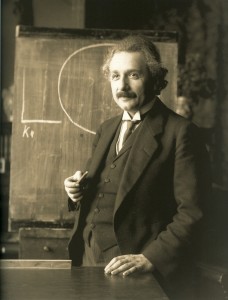
To my mild embarrassment, I still sometimes watch superhero movies. I mean, I thought I was out, but then Marvel dragged me back in with their, in retrospect, brilliant idea to make an interconnected universe of films and TV shows. It’s designed to elicit obsessiveness and loyalty. The movies don’t even have to be that good, though several are.
Anyway, so I’ve watched “The Avengers” several times. Too many times. And one part always bugs me. When Agent Coulson tries to explain to Captain America (dear God, I’m 34 years old) that Bruce Banner is a scientific genius, he says, “He’s like a Stephen Hawking.” Whom, Steve Rogers (the Captain, for the un-nerd) amusingly does not know — because he’s been frozen since the ’40s.
It’s a funny moment, but the joke requires a strain — why wouldn’t Coulson then say, “He’s like an Einstein”? In fact, why wouldn’t he reference Einstein from the beginning? Even were he not speaking to a WWII superhero who had been in freeze storage for 70 years (again, I am a 34-year-old adult), but just to, like, you or me, Einstein would be the natural scientific genius to name drop. You could have been frozen for even longer than the good captain, wake up today, and the world would still have the same poster boy (literally, often) for the genius of science as when you went under.
Einstein’s last major work, the general theory of relativity, dropped on the scene in 1916. Special relativity came out in 1905, as did Einstein’s paper on the photon theory of light, part of the physicist’s ‘miracle year.’ So, we’re talking roughly 100 years of dominance in the unofficial category of “Scientist Most Likely to Appear on Your T-Shirt.” That’s probably not going to change. He’s a logo now. He’s Mickey Mouse. He’s a Nike Swoosh. He’s Che.
But why? It’s a great question, and not one that I think I’ve explicitly asked myself. Why this guy? There have been other scientific geniuses, before and since (and contemporaneously). But Matthew Francis over at Aeon Magazine did ask. His answer (which, unfortunately, is the very last sentence of the piece) is:
“But because he lived in a special sliver of time, after the lights of fame had begun to shine bright, and before science came to be seen as a team sport, he has become our genius.”
It’s not a bad one. Einstein “arrived” just as the technology for today’s fame machine was coming into prominence. His theories had bearing on the global conflagration that would spawn the atomic age — an age of broad respect, fear and valuation of science and technology. He happened to be a refugee from the source country of said global conflagration, who arrived in the nation that would be the primary economic and political beneficiary of the war’s end. It was also the nation that would be primarily responsible for the coming celebrity culture: the nation with Hollywood and Madison Avenue in it. Plus, he had the hair and the playfulness of a lovable eccentric.
I’m not so sure about the second half of Francis’ reasoning. Does the general public now understand, more than they did in the past, that science is a collective effort, not the province of lone geniuses? I doubt it. The continued power of Einstein the image in the popular imagination would seem to suggest the opposite. I think Einstein maybe just got there first, and fit the spot really well. He worked, and continues to work, fantastically as a logo and mascot — for many reasons that a marketing expert might be able to explain.
You can look over at the burgeoning online fandom for Nikola Tesla. People still want to celebrate the eccentric, lone genius of science (and technology). They still want, wait for it, superheroes (callback!). Captain America and the Hulk are mascots of science fiction. They’ve got great branding that looks good on T-shirts. And for fans of science and sci-fi, they emblematize science in a digestible, tasty snack. Einstein does that, too.